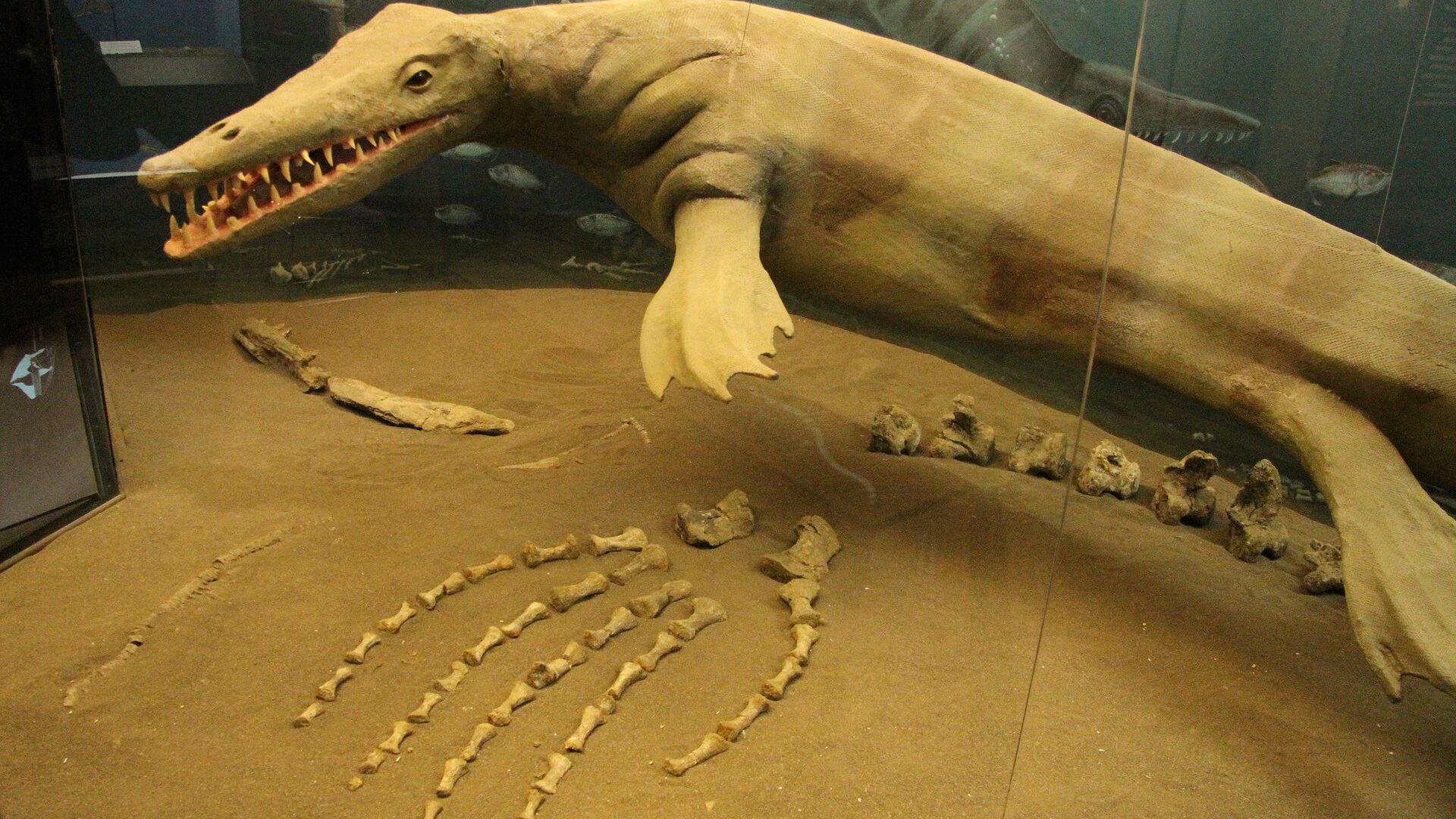https://en.sputniknews.africa/20230521/1059383022.html
Ancient Aquatic Reptile With Bizarre 'Screwdriver Teeth' Discovered Off Morocco
Ancient Aquatic Reptile With Bizarre 'Screwdriver Teeth' Discovered Off Morocco
Sputnik Africa
Paleontologists have discovered a now extinct species of mosasaur with bizarre screwdriver-like teeth that researchers say are like that of which they’ve never seen.
2023-05-21T09:52+0200
2023-05-21T09:52+0200
2023-08-04T17:50+0200
north africa
morocco
animals
science
university
https://cdn1.img.sputniknews.africa/img/07e7/05/15/1059383203_0:107:2048:1259_1920x0_80_0_0_e529f97ecc59eac6c152382a68f2f62a.jpg
Paleontologists have discovered a now extinct species of mosasaur with bizarre screwdriver-like teeth that researchers say are like that of which they’ve never seen.Its "strange, ridged teeth" are "unlike those of any known reptile," the university noted.Mosasaurs are huge, late Cretaceous-era aquatic reptiles which have been familiar to scientists for hundreds of years. But it’s the first time one with such an unusual dental arrangement has been identified, according to the lead author of the study, the Milner Centre for Evolution’s Dr. Nick Longrich.The specimen is "not like any mosasaur, or any reptile, even any vertebrate we’ve seen before," Longrich explained.Other experts expressed their surprise at the finding as well.Dr. Nathalie Bardet, a specialist in marine reptile life at the Museum of Natural History in Paris, said she was both "perplexed and amazed" at the discovery, noting: "I’ve worked on the mosasaurs of Morocco for more than 20 years, and I’d never seen anything like this before."
north africa
morocco
Sputnik Africa
feedback@sputniknews.com
+74956456601
MIA „Rossiya Segodnya“
2023
News
en_EN
Sputnik Africa
feedback@sputniknews.com
+74956456601
MIA „Rossiya Segodnya“
Sputnik Africa
feedback@sputniknews.com
+74956456601
MIA „Rossiya Segodnya“
paleontologists have discovered, extinct species, mosasaur with bizarre screwdriver-like teeth, researchers say, never seen, university of bath, press release, north africa, northern africa, african continent, african country, scientific discovery, museum of natural history, in paris, dinosaur morocco, dino
paleontologists have discovered, extinct species, mosasaur with bizarre screwdriver-like teeth, researchers say, never seen, university of bath, press release, north africa, northern africa, african continent, african country, scientific discovery, museum of natural history, in paris, dinosaur morocco, dino
Ancient Aquatic Reptile With Bizarre 'Screwdriver Teeth' Discovered Off Morocco
09:52 21.05.2023 (Updated: 17:50 04.08.2023) The strange specimen is distinguished by the numerous vertical blades on its teeth, which resemble the tip of a Phillips-head screwdriver.
Paleontologists have discovered a now extinct species of mosasaur with bizarre screwdriver-like teeth that researchers say are like that of which they’ve never seen.
The new species, Stelladens mysteriosus, "was around twice the size of a dolphin" and had "a unique tooth arrangement with blade-like ridges running down the teeth, arranged in a star-shaped pattern, reminiscent of a cross-head screwdriver," according to a press release by the UK’s University of Bath, which announced its discovery this week.
Its "strange, ridged teeth" are "unlike those of any known reptile," the university noted.
Mosasaurs are huge, late Cretaceous-era aquatic reptiles which have been familiar to scientists for hundreds of years. But it’s the first time one with such an unusual dental arrangement
has been identified, according to the lead author of the study, the Milner Centre for Evolution’s Dr. Nick Longrich.
The specimen is "not like any mosasaur, or any reptile, even any vertebrate we’ve seen before," Longrich explained.
"Along with other recent finds from Africa, it suggests that mosasaurs and other marine reptiles were evolving rapidly up until 66 million years ago, when they were wiped out by an asteroid along with the dinosaurs and around 90% of all species on Earth," the University of Bath’s press release noted.
Other experts expressed their surprise at the finding as well.
Dr. Nathalie Bardet, a specialist in marine reptile life at the Museum of Natural History in Paris, said she was both "perplexed and amazed" at the discovery, noting: "I’ve worked on the mosasaurs of Morocco for more than 20 years, and I’d never seen anything like this before."

